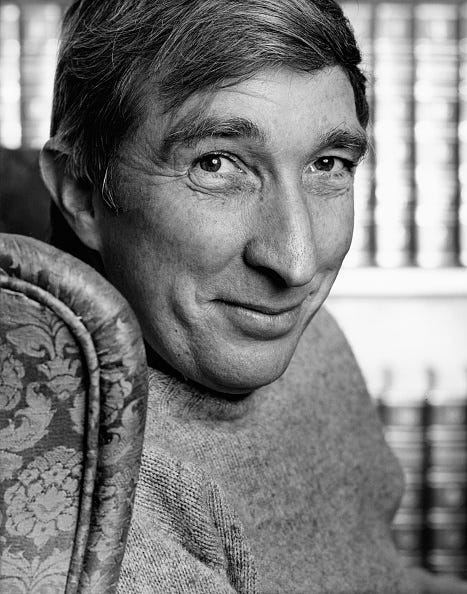The Writer's Almanac from Monday, March 18, 2013
"The Sometime Sportsman Greets the Spring" by John Updike, from Collected Poems. © Knopf, 1993.
ORIGINAL TEXT AND AUDIO - 2013
It's the birthday of novelist John Updike, born in Reading, Pennsylvania (1932). He went to Harvard and got married while he was still a student. His ambition was to be published in The New Yorker, and the year that he graduated from Harvard, he sold the magazine a poem and a short story. But he was also a gifted artist, and he and his wife moved to England so that he could study at Oxford's Ruskin School of Drawing and Fine Art. In England, he met E.B. and Katharine White, who worked at The New Yorker, and they told him he should work for the magazine, and soon he became a staff writer there. But much like E.B. White, he wanted to leave the city for a small town, and so the Updikes relocated to Ipswich, Massachusetts. He's most famous for his books about a regular middle-class man named Harry "Rabbit" Angstrom, a former small-town Pennsylvania high school basketball star: the novels Rabbit, Run (1960), Rabbit Redux (1971), Rabbit Is Rich (1981), and Rabbit At Rest (1990), and the novella Rabbit Remembered (1991).
He said: "My subject is the American Protestant small-town middle class. I like middles. It is in middles that extremes clash, where ambiguity restlessly lies."
It's the birthday of George Plimpton, born in New York (1927). He was the founding editor of The Paris Review, a job that he held for 50 years, from 1953 until his death in 2003, and he conducted long, insightful interviews — including one of only two interviews that Hemingway gave in his life.
It's the birthday of writer Manly Hall, born in Peterborough, Ontario (1901). He was fascinated by the occult and he traveled all over lecturing. He wrote quite a few books, and he is most famous for The Secret Teachings of All Ages: An Encyclopedic Outline of Masonic, Hermetic, Qabalistic, and Rosicrucian Symbolical Philosophy (1928). It took him six years to write the book, and during that period he worked for a while on Wall Street, which he hated. He wrote: "I felt strongly moved to explore the problems of humanity, its origin and destiny, and I spent a number of quiet hours in the New York Public Library tracing the confused course of civilization. ... Translations of classical authors could differ greatly, but in most cases the noblest thoughts were eliminated or denigrated. Those more sincere authors whose knowledge of ancient languages was profound were never included as required reading, and scholarship was based largely upon the acceptance of a sterile materialism." So he translated and interpreted the texts himself, and wrote his magnum opus.
It's the birthday of poet Wilfred Owen (books by this author), born in Shropshire, England (1893). When he was young, his family was well-off, living in a house owned by his grandfather, a prominent citizen. But then his grandpa died, and it turned out that the old man was broke, and the family had to leave and move into working-class lodgings in an industrial town.
He started writing poems as a boy, and he was good at literature and science, but he didn't do well enough on his exams to get a scholarship at a university. He enlisted to fight in World War I, and he became a lieutenant. In 1917, he was wounded, diagnosed with shell shock, and sent to a hospital to recuperate. There he met another soldier diagnosed with shell shock, Siegfried Sassoon, who was an established poet and mentored Owen. At the hospital, Owen wrote many of his most famous poems, including "Dulce et Decorum Est" and "Anthem for Doomed Youth." He was one of the first poets to depict the horrifying realities of war, instead of writing glorified, nationalistic poems.
But the next year, he went back to fight, and he was killed in battle at the age of 25. Two years later, Poems of Wilfred Owen (1920) was published.
Be well, do good work, and keep in touch.®






I've never been an Updike fan. Brilliant he was, but few are the sensible base of his Collected Poems™, and so are most of his Collections.
It's hard to follow a fine writer, let alone a good poet, which he was and is: "Updike famously identified sex, art, and religion as “the three great secret things” in human experience." He was onto three towers of our lives....the only one that truly lasts and carries us through life's challenges is "religion."
This is what I treasure in most of Mr. Keillor's writings and doings. Singing his and God's "Gospel Songs", Mr. K....and there's not nearly enough of them. They are the keys to the Heavenly Doors, which God knows we need to stay the portal.